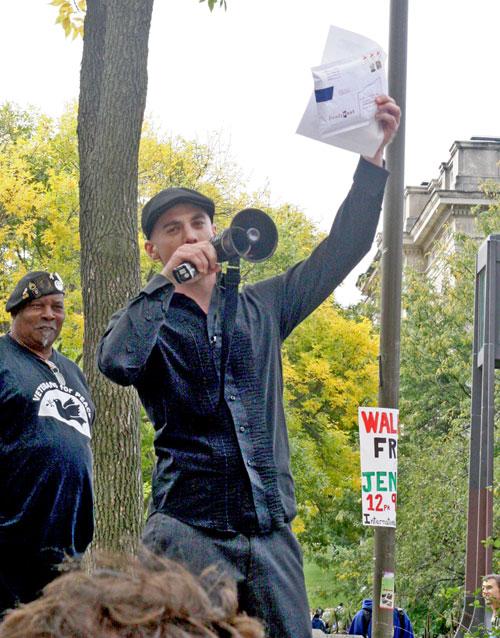An Iraq War veteran mailed back medals he earned in the conflict to protest American involvement in Iraq following a march at the state Capitol Wednesday. Former Army Reservist Josh Gaines, who served a tour in Iraq in 2004, sent an envelope containing two medals and an explanatory letter to former Secretary of Defense Donald Rumsfeld condemning government leadership on Iraq. "I wanted to show veterans aren’t afraid to speak up — aren’t afraid to do what’s right for the nation," Gaines said in a later phone interview. The symbolic action was meant to advocate the withdrawal of American troops from Iraq, according to Gaines. He opposes the rationale for the invasion of Iraq, as well as the government’s conduct of the war, he said. "I truly believe that I did not defend my nation … and did not fight terrorism (in Iraq)," Gaines said. Gaines read the letter aloud to a crowd gathered on Library Mall Tuesday afternoon before leading dozens of protestors down State Street to the Capitol. The march also protested the deployment of the Wisconsin National Guard to Iraq, calling for a "de-federalization" of the force to allow for its return. Once Gaines deposited the package in a postal box inside the Capitol, the group gathered outside the office of Gov. Jim Doyle to demand an audience about recalling Guard troops. Although the governor was not present, protest leaders spoke to Doyle staff members and reiterated their request for a meeting. The deployment of Wisconsin National Guard units to Iraq is a misuse of the force, protest leaders said. “With our National Guard overseas, we’re vulnerable if we have natural disasters," said University of Wisconsin senior Todd Dennis, who helped organize the protest as state coordinator for Iraq Veterans Against the War. "If we wouldn’t have been in Iraq … we probably wouldn’t have seen all those people lying in the streets dead (during Hurricane Katrina)," Gaines said. But the dual nature of the Guard as a state and federal militia is stipulated by the Constitution and beyond the governor’s control, according to Wisconsin Dept. of Military Affairs spokeswoman Jackie Guthrie. "They probably need to go back to the United States Constitution and lobby the people who can make changes to the Constitution," Guthrie said. The Wisconsin National Guard has supported the U.S. efforts in the global war on terror as needed, she said, but remains ready to respond to any emergency at home. "Never at any time has Wisconsin been left without National Guard protection when it needed it," she said. Doyle is "confident the troops we do have here at home are prepared to ensure Wisconsin is kept safe," according to spokeswoman Carla Vigue, but she said the governor will nevertheless consider the protesters’ concerns. The staff will evaluate the request for a meeting, which may or may not be possible based largely on the governor’s availability, Vigue said. "We’re hoping our faith (in Gov. Doyle’s staff) wasn’t misplaced, and if it was, we’ll go back again," fifth-year senior and event organizer Ryan Olander said. The protesters gathered not only to dispute the role of the National Guard but also to support Gaines in his decision to return his medals, according to Olander and other leaders. "I came to let him know I agree with what he’s doing, one vet to another," said Will Williams, a Vietnam War veteran who threw away his two Bronze Stars and a Purple Heart, among other medals, after the war. The action of publicly rejecting service medals is meaningful because it sends the message there is no honor in what they represent, Williams said. "Symbolically, it will tell people these medals are a joke," he said. According to organizers, Gaines is the first Iraq veteran to return his medals as part of a public protest. Overall, the younger generation of veterans is speaking up and “stepping out earlier than many ‘Nam vets,” Williams said. Gaines waited to return his medals until he was out of uniform, but said he’s proud to have finally gone through with the gesture, which he described as a political and personal vindication. "I don’t want to be sitting around with my grandkids someday, wondering why I didn’t try to make their country better for them," he said.
This article was corrected on Sept. 27, 2007. The original print version said the march to the Capitol occurred Tuesday, but should have said Wednesday. We regret the error.







